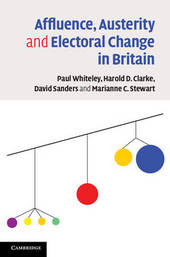
|
Affluence, Austerity and Electoral Change in Britain
Paperback / softback
Main Details
| Title |
Affluence, Austerity and Electoral Change in Britain
|
| Authors and Contributors |
By (author) Paul Whiteley
|
|
By (author) Harold D. Clarke
|
|
By (author) David Sanders
|
|
By (author) Marianne C. Stewart
|
| Physical Properties |
| Format:Paperback / softback | | Pages:332 | | Dimensions(mm): Height 226,Width 152 |
|
| ISBN/Barcode |
9781107641167
|
| Classifications | Dewey:324.630941 |
|---|
| Audience | | Professional & Vocational | |
|---|
| Illustrations |
31 Tables, black and white; 75 Line drawings, black and white
|
|
Publishing Details |
| Publisher |
Cambridge University Press
|
| Imprint |
Cambridge University Press
|
| Publication Date |
12 September 2013 |
| Publication Country |
United Kingdom
|
Description
Affluence, Austerity and Electoral Change in Britain investigates the political economy of party support for British political parties since Tony Blair led New Labour to power in 1997. Using valence politics models of electoral choice and marshalling an unprecedented wealth of survey data collected in the British Election Study's monthly Continuous Monitoring Surveys, the authors trace forces affecting support for New Labour during its thirteen years in office. They then study how the recessionary economy has influenced the dynamics of party support since the Conservative-Liberal Democrat Coalition came to power in May 2010 and factors that shaped voting in Britain's May 2011 national referendum on changing the electoral system. Placing Britain in comparative perspective with cross-national survey data gathered in the midst of the worst recession since the 1930s, the authors investigate how the economic crisis has affected support for incumbent governments and democratic politics in over twenty European countries.
Author Biography
Paul Whiteley is Professor of Government at the University of Essex. Harold D. Clarke is Ashbel Smith Professor in the School of Economic, Political and Policy Sciences at the University of Texas, Dallas and Adjunct Professor in the Department of Government at the University of Essex. David Sanders is Professor of Government at the University of Essex. Marianne C. Stewart is Professor in the School of Economic, Political and Policy Sciences at the University of Texas, Dallas.
Reviews'More than a sequel to the two highly regarded previous British Election Study volumes on the 2001 and 2005 campaigns, this book reinforces earlier evidence on the importance of valence issues with new material from the 2010 elections. Now the authors add a dynamic element, tracking the ebb and flow of party vote shares across elections - along with detailed new evidence on the campaign dynamics in 2010. Whiteley and his colleagues produce an impressive holistic model to explain how contemporary electoral democracy works in Britain and how it has been changing.' Russell J. Dalton, University of California, Irvine 'Affluence, Austerity and Electoral Change in Britain is sure to become one of the 'must-read' books on elections and voting, not only for students of British politics, but also for scholars in other countries who want to understand the dynamics of modern election campaigns and the explanatory power of alternative models of voting behaviour. A thorough, highly readable and sophisticated analysis of the rise and fall of New Labour, the political consequences of the 2007-8 economic crisis and related events, the austerity policies brought in following the 2010 election and the electoral prospects of the Cameron-Clegg coalition.' Lawrence LeDuc, University of Toronto 'There are 'good' election surveys and 'great' election surveys. The British Election Survey (BES), led by the Essex team, comes as close to the second category as any election survey yet. In this volume, these scholars combine concise data analysis with elegant prose, to explain how Brits pick their national political leaders. The story has elements of drama: the Northern Rock Bank failure, the hung parliament. And, there's continuity, such as the decline of class voting and the strength of valence issues such as the economy. The investigation uses avant garde research techniques, including the Continuous Monitoring Survey and internet sampling. The methodological and intellectual edge of the work furthers a tradition begun in the first BES, launched 50 years ago. [This book] stands as a fitting commemoration of that milestone.' Michael S. Lewis-Beck, F. Wendell Miller Distinguished Professor of Political Science, University of Iowa
|